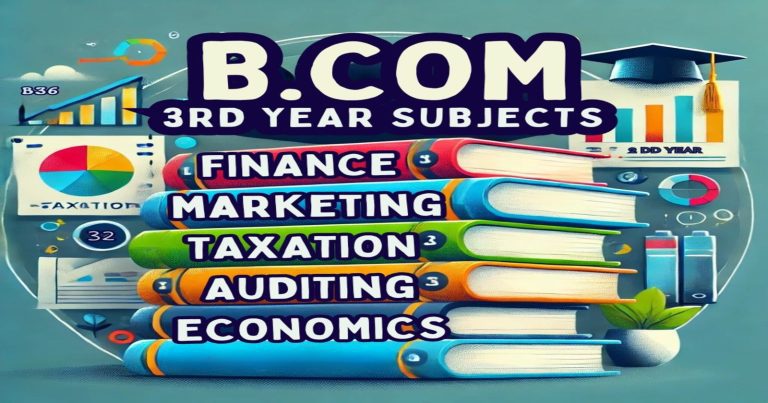B Com is an integrated program to prepare the student for dynamic roles in business, finance, and commerce. B com 3rd-year subjects are the outcome of comprehensive theoretical and practical learning that imparts special knowledge to students. This guide is divided into three sections – name of the subject, syllabus, and other aspects. This includes core subjects, electives, projects, and career prospects. In the final year, they focus on applying advanced concepts, choosing electives, and preparing themselves for industry roles or higher studies.
B Com 3rd Year Subjects
B com curriculum for semesters 5 and semester 6, mostly about advanced concepts Industrial knowledge, And practical applications to prepare students for professional roles Human resource management International marketing, and business planning a topics that are covered in this session. The above selection subjects are also open depending on the selected professional path. The following is a detailed explanation of various topics. That covers these sessions.
B Com Syllabus Semester 5
- Human Resource Management: HRM is the proper management of human resources in any organization. This also includes recruitment, training, motivating, performance appraisals, and labor relations. In the subject, this is made familiar to the minds of the students that having effective HR strategies goes hand in hand with achieving the organizational goals, which increase productivity and satisfaction for the employees concerned.
- Principles of Marketing: This course gives insights into the basics of marketing. The curriculum includes market segmentation, consumer behavior, branding, pricing strategy, and promotional campaigns. It lets the students know how businesses create value for customers and how they come up with a strong market position.
- Auditing and CorporatGovernancenc: Auditing teaches the students how to read the financial records to know whether they have complied with or not, besides knowing whether right or wrong. It will comprise of the following: auditing principles, controls, vouching, and verification. Corporate Governance practices business operations ethically, with transparency, and accountability towards the sustainable growth of the organization to build up stakeholder’s trust.
- Fundamentals of Financial Management: This module exposes students to the guiding principles of finance management in an organization. Major subjects include decisions on investments, capital budgeting, cost of capital, and working capital management. The course equips students with the essential tools to ensure sound financial decision-making and optimized resource use.
- Indirect Tax Law: This course encompasses indirect taxation, including GST and customs duty. Students are aware of tax structures and compliance requirements and how indirect taxes affect businesses and consumers alike.
- Entrepreneurship: Entrepreneurship is the kind of training that any individual needs to begin and manage a business. The students learn techniques on how to prepare business plans, how to calculate funding and find a way out when issues come in the startup ecosystem. Innovation and entrepreneurial thinking are encouraged.
- Microeconomic principles: It is the residual economic theories explained to the student earlier on the use of resources, production, and pricing. The student learns how markets behave, what the cost of production is, and how they can maximize their profit based on these economic concepts.
B Com Syllabus Semester 6
- Corporate tax planning: It gives a broad overview of the corporate tax law and their implementations. It includes the strategic plans of taxes which reduce liability for taxes, compliances regarding tax for corporations, and the role taxation plays in decision-making at a financial level.
- It also consists of banking and insurance.: This subject deals with banking institutions and insurance companies’ operations. The topics involved include the principles of banking, credit creation, risk management, and the types of insurance products. Students are conversant with the financial services industry and its contribution to the economy.
- Management Accounting: Management Accounting focuses on the use of accounting information for decision-making. It teaches students how to control costs, budgeting, financial analysis, and performance measurement. This topic includes the nature of accounting information in relationship with business strategic decisions.
- Computerized Accounting System: The course is conducted on accounting software, which includes Tally and QuickBooks. This course teaches students how to automate accounting procedures, generate financial reports, and adhere to accounting standards. The practical application of the computerized system is applied.
- International Business: Deals with the dynamics of international trade and commerce. There, the processes of export/import, management of foreign exchange, entry strategies for international markets, and the role of MNCs’ are discussed by the student. The subject readies the students for working in the global economy.
- Office Management and Secretarial Practice: Knowledge of office administration and managerial office functions is acquired by the Office Management and Secretarial Practice course. The practice is used to learn the secretarial aspect through which offices help in record-keeping, communicating, and even organizing.
- Fundamentals of Investment: Among the subjects the students are introduced to is Investment where the fundamental concept in investment planning and portfolio management is taught. There are topics such as financial instruments, risk-return analysis, and strategies in investments which provide much for students who would want to enter the field of finance and wealth management.
- Consumer Protection: Consumer Protection is related to consumer rights and legal provisions for fair trading. The subject provides knowledge of consumers’ rights, redressal mechanisms for grievance, and the responsibility of business toward its consumers.
- Personal Selling and Salesmanship: Personal Selling and Salesmanship is a study area of techniques and skills in personal selling. The areas of study included developing skills for meeting customer needs, developing customer relationships, and closing sales efficiently. The course introduces the importance of interpersonal skills and persuasion in the efficient process of selling.
- Indian Economy: The Indian Economy is a subject that discusses the overview of the economy of India in terms of economic development, including all the important sectors such as agriculture, industries, and services. This includes discussion on some of the key topics, like economic reforms, growth of GDP, unemployment, and poverty. Such topics make the students realize how the economy in India is structured and functions.
BCom 3rd Year Practical Subjects
Practical learning is an integral part of the BCom 3rd-year curriculum that bridges theory and practice. The practical subjects involve technical, analytical, and decisional learning applied to different spheres- accountancy, taxation, and business management. Practical Key Subjects are:-
1. Accounting Software Training
This course provides the student with practical knowledge of accounting software commonly used by firms, Tally, QuickBooks, and SAP. The tasks to be undertaken in this course are ledgers and bookkeeping; preparing invoices and reconciling the bank statements as well as preparation of financial reports. Mastery of such software keeps the student properly equipped for bookkeeping and management of finances during industry practice. Training is in the automation of accounting processes as a way to speed up business processes.
2. Taxation Practices
The students of this course have been highly interested in practical work, such as the preparation of income tax returns, computation of taxable income, and preparation of GST filings. They get an excellent feel of the calculation of deductions, exemptions, and penalties. Hence, they would be able to guide individuals and businesses in full ohe compliance with tax laws and effective tax planning.
3. Project Work
The final-year projects aim to position students in real business problems. Students are assigned topics under areas like financial analysis, market research, or strategy development relating to HR. The subject is utilized to train the students in their analytical, research, and presentation skills. More often than not, project work involves working with businesses, and hence the students think critically and solve problems to provide actionable insights.
BCom 3rd Year Projects
Third-year projects enable the student to apply what he or she has learned from academic knowledge in a real-life business problem. It usually concludes everything that has been learned during the course and will ask them to be innovative, either individually or with others, on what to produce for the project. Examples of Projects:-
1. Financial Analysis
They assess a company’s financial position based on annual reports. With these reports, students assess various metrics such as profitability, liquidity, and solvency of key elements through methods such as ratio analysis, cash flow statements, and balance sheets. During this project, they construct monitoring business performance in the ability and recommendation for its improvement of a firm’s financial status.
2. Market Research
Other research projects include: market surveys, interviews, or focus groups to generate an understanding of consumer behavior and preferences. For instance, the students can research the demand for a given product or service in a specified geographic area. This project will enable the student to have a good understanding of data collection, interpretation, and presentation, all of which are essential elements in marketing and business strategy functions.
3. Startup Business Plan
A business plan is the most common project that includes designing an all-inclusive strategy for the launch of a startup. Under this project, students learn about market analysis, competitor research, financial projections, plans for operations, and funding strategies. It helps the students understand the intricacies involved in business operation and management while helping them become more entrepreneurs.
Importance of Practical Subjects and Projects
Practical subjects and projects are essential in preparing students for challenges in the professional world. Students will acquire, through hands-on learning, the following industry-relevant skills: accounting software, tax compliance, and research methodologies.
- Problem-solving skills: ability to solve problems based on real life in finance, marketing, and operations.
- Presentational and Communication Skills: Effective reporting and communication of findings through reports and presentations.
The BCom 3rd-year curriculum ensures students are job-ready and confident for the best performances in finance, marketing, and entrepreneurship.
Career Prospects After B Com
The B.Com program prepares students for a variety of high-demand roles in finance and accounting. Here’s an overview of the top career options
| Job Role | Description | Average Salary (INR) |
| Chartered Accountant | Offers expert advice in auditing, taxation, and financial planning. | ₹6–12 LPA |
| Auditor | Ensures accuracy and compliance in financial records for businesses. | ₹4–8 LPA |
| Tax Consultant | Specializes in tax planning, filing returns, and legal compliance. | ₹3–7 LPA |
| Financial Analyst | Analyzes financial data to assist businesses in decision-making and investments. | ₹4–10 LPA |
| Corporate Accountant | Manages financial records and reporting for large organizations. | ₹3–6 LPA |
BCom 3rd Year Books: Titles and Authors
- Advanced Accounting – By R.L. Gupta and M. Radhaswamy
- Corporate Accounting – By S.N. Maheshwari and S.K. Maheshwari
- Management Accounting – By Khan and Jain
- Financial Management – By Prasanna Chandra
- Auditing Principles and Practices – By Ravinder Kumar and Virender Sharma
- Indian Taxation Laws – By V.K. Singhania and Monica Singhania
- Cost Accounting: Principles and Practice – By M.N. Arora
- Human Resource Management – By K. Aswathappa
- Marketing Management – By Philip Kotler
- Statistics for Management – By Levin and Rubin
B com 3rd year Subjects FAQs
1. What are the core BCom 3rd year subjects?
The Core subjects include Corporate Accounting, Auditing, Taxation, Financial Management, and Business Laws.
2. What is BCom’s full form?
BCom is the short form for Bachelor of Commerce. It is an Undergraduate Course for 3 years that focuses on a career in business, finance, and commerce.
3. What are some BCom jobs after graduation?
Some job roles are popular such as Financial Analyst, Accountant, Tax Consultant, Investment Banker, and Marketing Executive.
4. Average BCom salary in India
The starting salary for BCom graduates ranges between ₹2.5 LPA to ₹4 LPA.
5. What are the options for higher studies after BCom?
Students can pursue an MBA, MCom, or professional certifications like CA, CS, or CFA.


